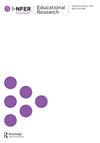Exploring pupils’ perspectives on school climate
IF 2.6
3区 教育学
Q1 EDUCATION & EDUCATIONAL RESEARCH
引用次数: 5
Abstract
ABSTRACT Background: School climate is crucial: its character can affect pupils’ academic achievement, teachers’ working conditions and the wellbeing of everyone at school. A major concern for teachers is how to prevent and manage disruptive behaviours. Against this backdrop, there is a need for thorough investigation of pupils’ perspectives to better understand their perceptions of the climate at their schools and their views about why disruptive behaviours occur. Purpose: In this small-scale, qualitative study, we aimed to contribute to the body of school climate research by exploring pupils’ perspectives on school climate, teachers and relationships at school. Method: We conducted an in-depth qualitative analysis, exploring pupils’ perspectives on these issues through focus group interviews. Eighteen semi-structured interviews were conducted (n = 104) with grade 1–9 (7- to 15-year-old) pupils from a school in Sweden. The interview guide included questions about sense of safety, relationships at school and in classrooms, and pupils’ views of teachers. Constructivist grounded theory was used as the analytical framework. Findings: A recurrent pattern identified in the data was the focus on disruptive behaviours and how these were connected to the pupils’ learning environment, sense of safety and teachers. Three core categories were conceptualised from the pupils’ perspectives: (a) within-pupil explanations, (b) teaching style explanations and (c) peer group process explanations. We adopted a social-ecological approach to conceptualise the complexities and interplay of factors addressed by the pupils in their perspectives on disruptive behaviours. Conclusions: Our findings provide insight into the way that different factors interplay in the emergence of disruptive behaviours in the classroom, nested within both contextual and structural aspects. This analysis of pupil perspectives also points to the importance of a whole-school approach in which teachers establish a warm, responsive and confident teaching style in the classroom and in the playground to influence the social dynamics.探索学生对学校氛围的看法
摘要背景:学校氛围至关重要:它的特点会影响学生的学业成绩、教师的工作条件以及学校里每个人的福祉。教师关心的一个主要问题是如何预防和管理破坏性行为。在这种背景下,有必要对学生的观点进行彻底调查,以更好地了解他们对学校气候的看法,以及他们对为什么会发生破坏性行为的看法。目的:在这项小规模的定性研究中,我们旨在通过探索学生对学校气候、教师和学校关系的看法,为学校气候研究做出贡献。方法:我们进行了深入的定性分析,通过焦点小组访谈探讨学生对这些问题的看法。对瑞典一所学校的1-9年级(7-15岁)学生进行了18次半结构化访谈(n=104)。面试指南包括关于安全感、学校和课堂上的关系以及学生对老师的看法的问题。建构主义基础理论被用作分析框架。调查结果:数据中发现的一个反复出现的模式是关注破坏性行为,以及这些行为与学生的学习环境、安全感和教师之间的联系。从学生的角度对三个核心类别进行了概念化:(a)学生内部解释,(b)教学风格解释和(c)同伴群体过程解释。我们采用了社会生态学的方法,从学生对破坏性行为的角度,对学生所处理的因素的复杂性和相互作用进行了概念化。结论:我们的研究结果深入了解了不同因素在课堂上出现破坏性行为的相互作用方式,这些行为嵌套在上下文和结构方面。对学生观点的分析也指出了整个学校方法的重要性,在这种方法中,教师在课堂和操场上建立一种热情、反应灵敏和自信的教学风格,以影响社会动态。
本文章由计算机程序翻译,如有差异,请以英文原文为准。
求助全文
约1分钟内获得全文
求助全文
来源期刊

Educational Research
EDUCATION & EDUCATIONAL RESEARCH-
CiteScore
4.00
自引率
2.90%
发文量
0
期刊介绍:
Educational Research, the journal of the National Foundation for Educational Research (NFER), was established in 1958. Drawing upon research projects in universities and research centres worldwide, it is the leading international forum for informed thinking on issues of contemporary concern in education. The journal is of interest to academics, researchers and those people concerned with mediating research findings to policy makers and practitioners. Educational Research has a broad scope and contains research studies, reviews of research, discussion pieces, short reports and book reviews in all areas of the education field.
 求助内容:
求助内容: 应助结果提醒方式:
应助结果提醒方式:


